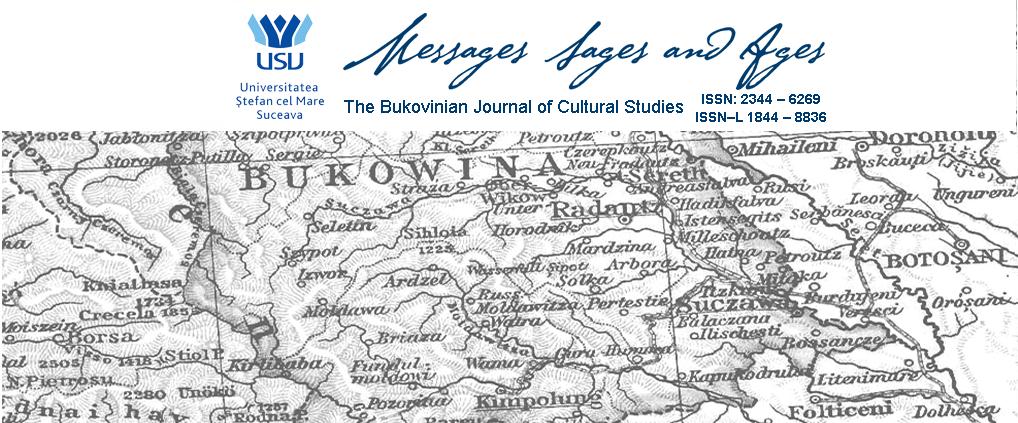T(r)opophilia: Haunting/Haunted Places
The academic journal Messages, Sages and Ages (http://www.msa.usv.ro/), based at the English Department, University of Suceava, Romania, invites contributions for an issue focusing on t(r)opophilia: sense/love of place.
If the nineteenth century and the former part of the twentieth developed a fascination with time and history exclusively, the past fifty years have paid greater attention to the category of space. After the quantitative turn of the 1960s and the linguistic and cultural turn of the 1980s, a “landscape” or “spatial” turn quite naturally followed, infiltrating most of the social sciences and the humanities (from anthropology to sociology, from history to philosophy, from psychology to psychoanalysis, from literature to literary criticism etc.).
Even though the phrase as such was only introduced in the mid-nineties by the human geographer Edward Soja (whose trialectics of spatiality argues for real and imagined spaces to be brought together), many a philosopher and humanities scholar had actually paved the way for this “spatial turn”: Martin Heidegger, Ernst Cassirer, Mircea Eliade, Michel Foucault, Henri Lefebvre among others proposed theories of spatial experience and attempted to coin a universal language to account for the man-place relationship. Terms like commons, raum, palimpsest, pseudoenvironment, abstract place, symbolic place, panopticism, heterotopia, lived / felt space have become part and parcel of a new (yet ironically based on commonplace) paradigm.
English-American poet W. H. Auden is ostensibly the first to notably use the word topophilia in his introduction to John Betjeman’s book Slick but not Streamlined (1947) which he hoped “will inspire American topophils to take poetry seriously and American poets to take topophilia seriously.” The places Betjeman described are the interwar suburbs of England. Eleven years later, Gaston Bachelard, the French phenomenologist, revisits topophilia in his Poetics of Space (1958), where he investigates the “felicitous space” in order to “determine the human value of the sorts of space that may be grasped, that may be defended against adverse forces, the space that we love” (p. xxxi). Spatial types such as the attic, the cellar, drawers and the like are considered with a view to highlighting the emotional response to buildings (in literary works as well as in everyday life).
Love of place is also popularized by Yi-fu Tuan’s 1974 Topophilia: A Study of Environmental Perception, Attitudes and Values. For Tuan, who refers neither to Auden nor Bachelard, topophilia is “the affective bond between people and place or setting” (p. 4). An equally compelling account of the complexity of sense of place can be found in Christian Norberg-Schulz’s Genius Loci. Towards a Phenomenology of Architecture (1980), which draws on the age-old belief in the guardian spirit of a place. The character (i.e. local distinctiveness or energy fields) of a given place, as well as man’s compatibility with it, are among Norberg-Schulz’s main concerns.
Punning on topos and tropos (Greek term for “turn”, “change”), Jon Aderson and Kathryn Erskine ingeniously come up with a new term in their 2012 article Tropophilia: A Study of People, Place and Lifestyle Travel, in which they complete the “rooted, static and stable set of relations with place” expressed by topophilia with the love of mobility, change and transformation in the person-place relation suggested by tropos.
In an attempt to rethink the relation between place and literary/artistic creation, we invite papers on subtopics such as:
- the ways texts convey space
- the power of description, hypotyposis and ekphrasis
- special abodes
- shared spaces
- haunted p(a)laces
- fictional / utopian places
- virtual environment
- literature as a means of organising space
- genius loci
- geographical (in)compatibility
- urbanism / tourism
- spaces of / in translation
- the semantics of space
We welcome papers in English and invite proposals (no more than 9,000 words) from senior as well as junior academics. Please send the manuscript, an abstract (cca. 200 words) with 5 keywords, and a brief curriculum vitae as attachments to BOTH msa@usv.ro and msa_usv@hotmail.com.
Deadline: June 1, 2018.
